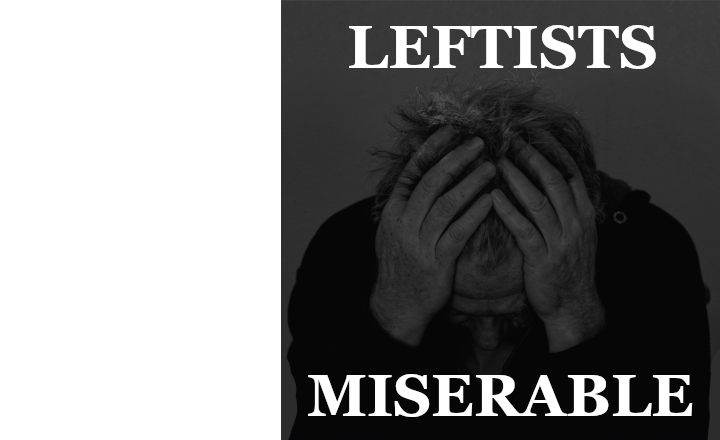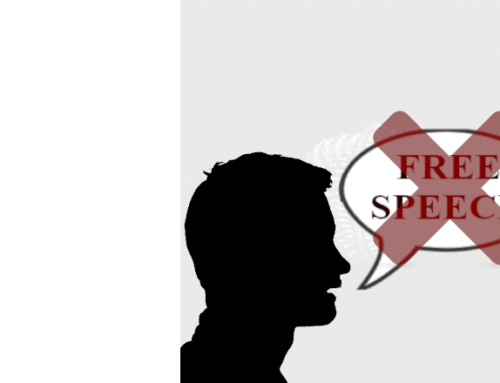It was the day after Ronald Reagan beat Jimmy Carter in the 1980 presidential election. I was smiling (I had run Reagan’s campaign in the North Hills of Pittsburgh), but most of the other professors at La Roche College (now a university) were sulking, and many appeared depressed. However, their mood was not uncharacteristic of the way they were most of the time: There are a lot of unhappy campers in the professoriate, especially in the liberal arts.
Nothing has changed.
In a new study by psychologists in Finland assessing the state of mind of radical social justice devotees, it was found that those who bought into progressive ideas are profoundly unhappy. Published in the Scandinavian Journal of Psychology, the researchers started with a sample of 851 persons, mostly students and professors at the University of Turku, and then expanded it to 5,030 adults. They distinguished between those who hold to a traditional liberal perspective and those who identify with a radical one. They focused on the latter.
The researchers devised a Critical Social Justice Attitude Scale (CSJAS) that measured seven aspects of what they deemed as representative of “woke” politics. Most of the items dealt with race, though one tapped transgenderism (the idea that the sexes are interchangeable). For example, “University reading lists should include fewer white or European authors” was deemed reflective of the “woke” view.
Social justice attitudes, the study’s authors said, “perceive people foremost as members of identity groups and as being, witting or unwitting, perpetrators or victims of oppression based on the groups’ perceived power differentials; and advocate regulating how or how much people speak and how they act if there is a perceived power differential between speakers, and intervening in action or speech deemed oppressive.”
The conclusions were riveting.
Regarding the initial small sample, it was determined that high CSJAS scores were “linked to anxiety, depression, and a lack of happiness.” On the larger sample, “this lower mental well-being was mostly associated with being on the political left and not specifically with having a high CSJAS score.” Women were more likely than men to have high CSJAS scores, which explains why their happiness quotient was smaller.
The researchers noted that their findings were consistent with that of other studies on this subject. They are right about that.
“Liberals, especially liberal women, are significantly less likely to be happy with their lives and satisfied with their ‘mental health,’ compared to their conservative peers aged 18-55.” According to University of Virginia sociologist W. Brad Wilcox, this was “the big takeaway from the 2022 American Family Survey, a striking new poll from YouGov and the Deseret News.”
In 2023, Musa al-Gharbi, a sociologist at Columbia University, examined data from many studies on this subject and concluded that conservatives are indeed happier than liberals. He said this finding “is consistent across countries and extends back in time.”
The question remains: Why are those on the left so miserable?
For starters, consider this. Imagine waking up each day thinking the world is made up of oppressors, racists, sexists, homophobes and their victims. Is that likely to put a smile on your dial?
It’s actually worse than this. Left-wing professors, which is to say most of them in the social sciences and humanities, love to bask in their negativity. Smug as can be, they love thinking that those who don’t share their views are ignorant buffoons; they, of course, are the only really bright ones. Their darkness is their defining characteristic.
But why do these malcontents think this way?
It has much to do with what Catholicism calls the sin of pride, the belief that we are self-sufficient human beings and have no need for God. The big thinkers believe they are too smart to believe in God. Too bad they aren’t smart enough to know that boys who claim to be girls should not be allowed to compete against girls in sports and shower with them. There must be a cavity in their brain when it comes to sex.
It must be said that while those on the left are the most likely to be unhappy, it has been my experience that extremists on the right are just as likely to be despondent.
I have often said that when I encounter a highly educated person, or an activist, for the first time, I know within minutes if I am dealing with an extremist. The individual could be on the right or the left—it doesn’t matter. The common denominator is humorlessness. They rarely smile and their bouts of laughter usually come at someone else’s expense.
Smiling is important. Laughter is important. They are staples of mental health. Hanging around those who are habitually unhappy—for reasons wholly due to their cast of mind and their inflated idea of who they are—is a chore. It’s also a bore.
The Finnish psychologists learned that left-wing “woke” mavens find it hard to be happy. The deeper problem is that they actually like it that way.







